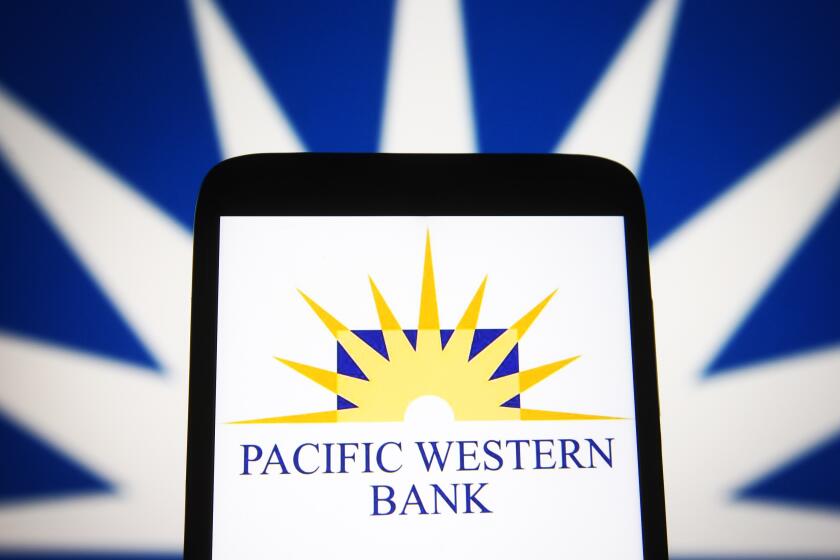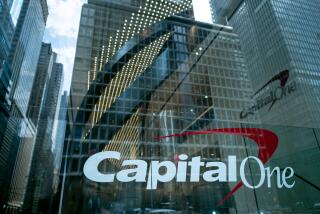PacWest to be sold to Banc of California in rescue deal

- Share via
PacWest Bancorp is merging with smaller rival Banc of California as it seeks to navigate a bout of upheaval that brought down a handful of its peers.
The banks said in a statement that Centerbridge Partners and Warburg Pincus will invest $400 million as part of the deal to obtain about 20% of the combined company and warrants to buy more shares. PacWest stockholders will get 0.66 of a share of Banc of California common stock for each of their shares. The banks will sell assets with the aim of repaying $13 billion of wholesale borrowings, the companies said Tuesday.
Shares of Banc of California surged as much as 22% after the Wall Street Journal reported that the pair were in talks. PacWest shares closed down 27%.
The merger is aimed at shoring up confidence in U.S. regional banks after a run on deposits struck several lenders this year, leading to the collapse of three California-based banks and one in New York. Rising interest rates depressed the value of bonds they bought when rates were low, and the sudden surges in customer withdrawals forced some of them to sell those assets at a loss.
The combined bank will have about $36 billion of assets, less than what PacWest alone had at the end of March. The firms will carry the Banc of California name, and that firm’s chief executive, Jared Wolff, will lead management. The deal is expected to close late this year or early in 2024.
“This transformational merger will create a robust, well-capitalized and highly liquid institution poised to deliver exceptional service to even more California businesses and communities,” Wolff said. “We believe both Banc of California and PacWest stockholders will benefit from the compelling economics of the combined company.”
PacWest, a Beverly Hills-based regional bank, has been shedding assets to improve liquidity. In May, the bank said it was weighing strategic options and had been approached by potential investors. Shortly after that, it sold a pile of real estate loans to Kennedy Wilson Holdings Inc., an asset-backed loan portfolio to Ares Management Corp. and tapped an Apollo Global Management unit for a financing facility.
PacWest Bancorp., a regional bank teetering after the collapse of three rival lenders, has been weighing a range of strategic options, including a sale, according to people familiar with the matter.
Santa Ana-based Banc of California had $10 billion of assets at the end of March, making it less than a quarter of the size of PacWest. But it saw relatively small deposit outflows in the first quarter, and its 17% stock drop this year through Monday was mild compared with PacWest’s decline of 54%.
After the deal closes, the combined company will have $25.3 billion in total loans, $30.5 billion in total deposits and more than 70 branches in California, according to the statement. The combined bank expects to earn $1.65 to $1.80 a share next year.
PacWest isn’t counted among the industry’s giants, ranking outside the 25 biggest U.S. banks. Established in 1999, PacWest focused on small, middle-market and venture-backed businesses. The bank grew in part through 31 acquisitions since 2000, with offices in California, Durham, N.C., and Denver, plus loan-production offices around the country. It had 2,438 full-time, part-time and temporary employees at the end of last year, according to regulatory filings.
Chief Executive Paul Taylor tried multiple times this year to reassure investors about PacWest’s stability, with the bank saying in March that it had taken steps to get rid of non-core products and boost earnings, which led deposits to stabilize.
PacWest’s total deposits stood at $27.8 billion as of Friday, according to a company presentation. The company said that was up more than 7% from mid-May.
Banc of California will be the legal acquirer.
Bloomberg writer Katherine Doherty contributed to this report.
More to Read
Inside the business of entertainment
The Wide Shot brings you news, analysis and insights on everything from streaming wars to production — and what it all means for the future.
You may occasionally receive promotional content from the Los Angeles Times.











